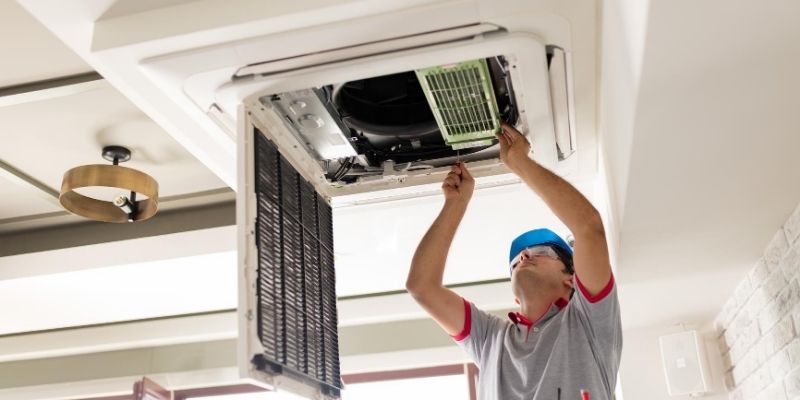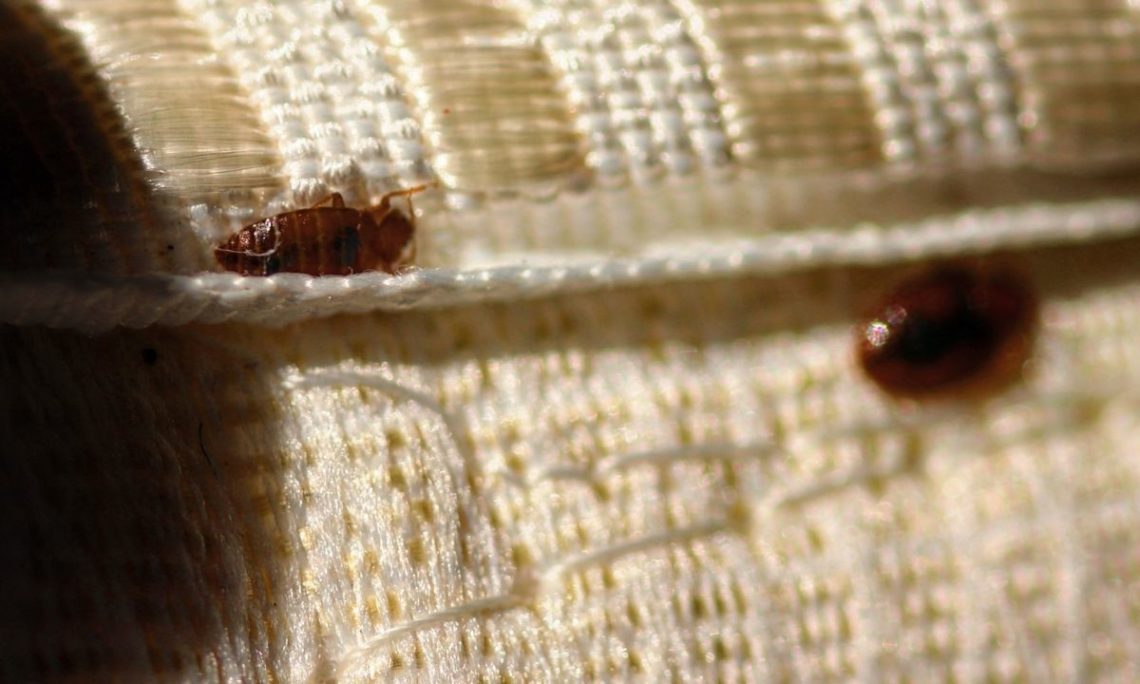Lori Ballen, the owner of this website, benefits from purchases made through her affiliate links.
There’s nothing more refreshing than walking into an air-conditioned home after being outside under the hot summer sun. The sensation of cool air flowing across your skin will instantly relax your body and improve your comfort.
As a homeowner, though, you should follow some necessary steps to maintain your air conditioning system this summer. If it fails, you and your family could have an unbearable few hot months, especially if you live in Vegas.
Thankfully you can avoid air conditioning woes by giving your system a little attention.
#1) Clean or Replace Filter

To ensure optimal performance, clean or replace your system’s air filter every 60 to 90 days.
The filter removes dust, dirt, mold, bacteria, and particulate matter from the air. As air enters the system, it travels through the filter, where these pollutants are removed.
When neglected, however, the filter will become clogged with debris. This clog restricts the flow of air and lowers the system’s performance.
There are two primary types of air filters: disposable and reusable. The most common type, disposal, must be replaced with a new filter of the same size. If your system has a reusable filter, you can wash it with soap and water.
#2) Inspect Return Registers
Inspect your air conditioner’s return registers, also known as return vents, to ensure they are clear.
Blocking them with furniture, appliances, or even a pile of dirty clothes will lower your system’s performance.
Unlike standard vents, return registers don’t release cooled air.
Instead, they are used to draw air into the air conditioning system to cool and send back out the standard vents.
If your return registers are blocked, you may notice lower cooling power because there’s less air flowing into the system.
#3) Clean Condenser Coils
Another essential step to keeping your air conditioner running smoothly this summer is to clean the condenser coils.

Typically found outside, the condenser unit converts gas refrigerant to liquid refrigerant, allowing heat to release. Dirty condenser coils prevent an air conditioner from efficiently moving indoor heat to outside the home.
When leaves, dirt, and dust cover the coils, less heat is released from the refrigerant, forcing the air conditioner to work harder.
You can clean your condenser coils by disconnecting power to the unit and spraying it with a garden hose.
For stubborn debris, use a brush or fin comb to scrub the coils. Alternatively, you can hire an HVAC technician to clean your condenser coils.
Either way, you should clean them during summer to lighten the load on your air conditioner.
#4) Clean Evaporator Coils
In addition to the condenser coils, you should also clean your air conditioner’s evaporator coil.

Typically found inside the home, usually in the attic, the evaporator unit collects heat from inside your home to be expelled outside through the condenser unit.
Less heat is removed from your home when the evaporator coils become dirty. You can clean evaporator coils by scrubbing them with a brush soaked in soapy water.
Just remember to disconnect power to the unit beforehand.
#5) Inspect Drain Line
The drain line is responsible for carrying condensation produced by your air conditioner’s evaporator coils to outside your home.

As the unit removes heat from your home’s air, it creates condensation as a byproduct. Typically, this condensation drips onto a metal pan below the evaporator unit, after which gravity pulls the water down a plastic pipe leading to the home’s exterior.
If your air conditioner’s drain line is clogged, however, water may accumulate inside your home. This clog can lead to other headaches, such as mold and moisture damage.
To prevent problems such as these, inspect your drain line to ensure that it releases water properly. If it’s clogged and water is collecting in the pan below your evaporator unit, try flushing it with distilled white vinegar.
Pouring vinegar into the pan will flush mildew and mold from the drainpipe, allowing condensation to flow.
#6) Program the Thermostat
It would be best to program your air conditioner’s thermostat to achieve the right balance of energy efficiency and comfort.

Running the air conditioner on the lowest temperature setting 24 hours a day isn’t the smartest idea. Although it will create a cool and comfortable environment, it will use a lot of energy as well.
Therefore, you should program your thermostat for more cooling power when your home is occupied.
If you and your family are gone from 8 a.m. to 4 p.m., there’s no need to run the air conditioner on full blast.
You can set the temperature on your thermostat to 78 degrees during these hours, for instance, and set it to 74 degrees or lower when people are home.
While a four-degree difference may sound insignificant, the savings on your monthly electric bills will quickly add up.
#7) Inspect Refrigerant Lines
Typically made of copper, refrigerant lines are pipes in an air conditioning system through which refrigerant flows.
Most systems have two refrigerant lines: a suction line that transports refrigerant in a gas state and a smaller liquid line that carries coolant in a liquid state.
If either of the lines is damaged, the refrigerant will leak from the system, causing your air conditioner to blow room temperature air.
When inspecting your refrigerant lines, make sure the suction line — it’s the larger of the two — is insulated.
Missing or damaged insulation exposes the cooled refrigerant gas to warm air, which forces the condenser unit to work harder.
Without proper insulation, the suction line may also develop condensation that drips onto the floor below.
#8) Monitor and Regulate Humidity
Indoor humidity can lower your air conditioner’s performance.

Air conditioners have two functions: to remove heat from the home and to remove moisture vapor from the house.
If your home is humid — a relative humidity of 60 percent or higher — your air conditioner must work harder to remove the moisture vapor.
Assuming your air conditioner is the right size for your home and that your home is adequately insulated, it should be able to control the humidity level without any ill effect on its cooling performance.
However, if your air conditioner is too big or too small, humidity can take a toll on its performance.
Invest in a humidity monitor for your home so that you’ll know exactly how humid it is. If the humidity climbs above 60 percent, install a dehumidifier in the center of your home.
#9) Inspect Ducts
Unless you have a split ductless system, your air conditioner probably has ducts. These large, insulated conduits draw and expel air.
As the system produces cool air, the air is sent through the ducts and into the house via the supply vents.
There are also ducts connected to the return vents, which move air in the opposite direction.
If either type of ducts becomes damaged, your air conditioner may struggle to cool your home.
#10) Get a Tune-Up
The most important form of preventive maintenance to keep your air conditioner running all summer is an HVAC tune-up.
During a tune-up, a technician will perform a full inspection of your air conditioner and its components, as well as make adjustments to achieve optimal performance and efficiency.
A tune-up can identify small problems like a minor refrigerant leak before turning into a bigger, more costly problem like a non-functional air conditioner.
Don’t let a broken or under-performing air conditioning system prevent you and your family from enjoying the summer.
Follow these ten tips to maintain your home’s air conditioner and beat the heat.
- 10 Best Cordless Vacuums for Pet Hair
 You can wade through the pages sorting through the details or read through our list of the best cordless vacuums for pet hair.
You can wade through the pages sorting through the details or read through our list of the best cordless vacuums for pet hair. - The Best Carpet for a Basement: 3 Factors to Consider
 Here are some factors to consider when choosing the best carpet for a basement.
Here are some factors to consider when choosing the best carpet for a basement. - What is the Best Home Water Filtration System?
 We’ve compiled a list of the best home water filtration systems so you can make an informed and smart decision for yourself and your family.
We’ve compiled a list of the best home water filtration systems so you can make an informed and smart decision for yourself and your family. - Can Cats Find Their Way Home
 There’s no question that cats are smart creatures — but can cats find their way home? According to some experts, the answer is yes.
There’s no question that cats are smart creatures — but can cats find their way home? According to some experts, the answer is yes. - Will Heat Treatment for Bed Bugs Damage My Home?
 In this blog post, we’ll discuss the pros and cons of heat treatment for bed bugs and help you decide if it’s the right solution for you.
In this blog post, we’ll discuss the pros and cons of heat treatment for bed bugs and help you decide if it’s the right solution for you.




